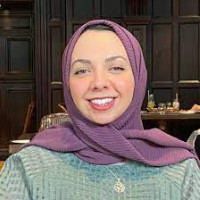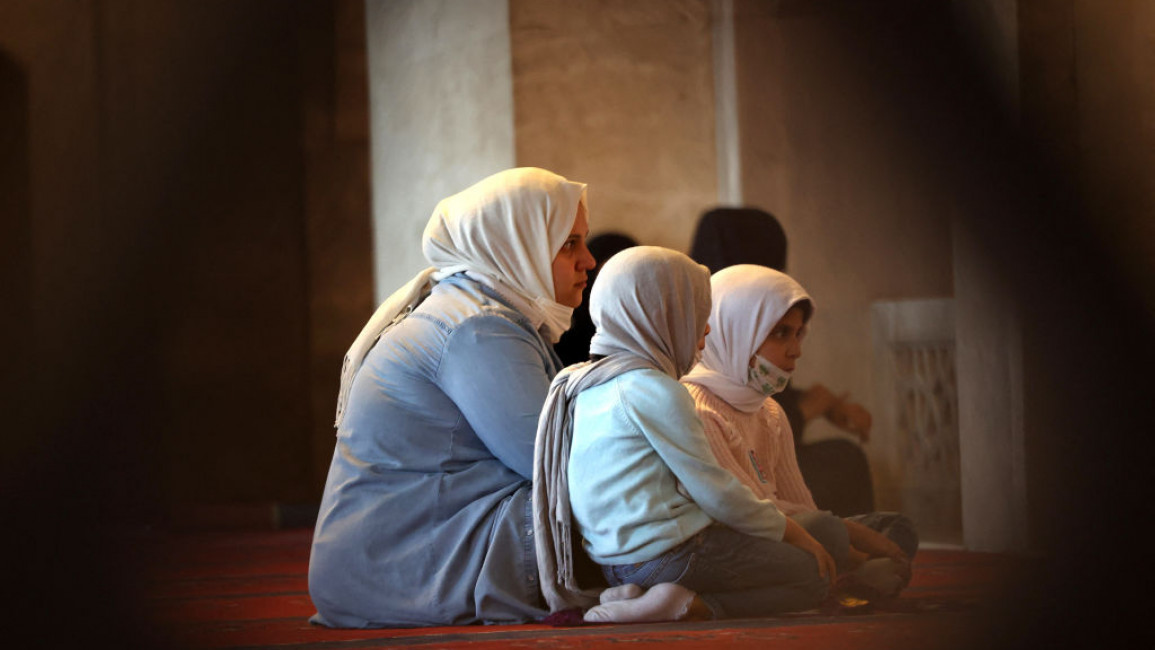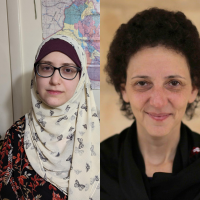
Ramadan: Our mosques need to be accessible to mothers & children, that is the Prophetic tradition
Some of my favourite stories of the Prophet Muhammad (pbuh) are the ones that involve children and prayer. From letting his grandchildren climb over him in prostration to shortening a congregational prayer upon hearing the cries of a baby so as not to trouble its mother, through the Prophet Muhammad (pbuh) we are given a template for being compassionate and truly inclusive towards mothers and children in our places of worship. But for mothers like me, it can sometimes feel like we have strayed a million miles away from this prophetic example today.
In Islam, mothers are elevated to lofty ranks and honoured three times over fathers. But since becoming a new mum myself, I’ve been struck by how overlooked and forgotten mothers can be in our community. How, all too often, it can feel as though we are expected to simply get on with the relentless and all-consuming act of mothering and not bother anyone with our needs. Especially during Ramadan.
During Ramadan, Muslim mothers are often reassured that everything we already do for our family is an act of worship. From cleaning to hoovering, cooking for our children or getting them to school on time - all of that is worthy of immense reward from Allah.
''The innate human need for spiritual connection, transformation and introspection doesn’t suddenly stop once a woman gives birth. I’d argue that the sheer selflessness (and utter exhaustion) of motherhood makes us even more desperate for some devotional self-care. So when our loved ones rush off for Taraweeh and mothers are left at home with an unsettled baby, it can feel incredibly isolating. As though Ramadan is not for us. As though our community has forsaken us.''
On the one hand that can be very comforting. This Ramadan, I’ve found myself left with little time to perform extra prayers or read hours of Quran because my days are taken up with looking after an energetic 16-month old. The chance to think of this not as domestic drudgery but as deeds to be rewarded by my Creator gives me something that our capitalist system does not: recognition for my (unpaid) labour as a mother.
But what’s frustrating is that this refreshing and merciful leniency offered to mothers is all too often warped into a way to gag women who demand better from our community spaces. Yes, cooking can be an act of worship with the correct intention, but no matter how hard I try, I won’t feel the same intense connection to Allah as I would if I was spending the night reciting and contemplating the Quran. And praying whilst watching out of the corner of my eye is never going to provide the same spiritual experience as Taraweeh (prayers) in the mosque with my fellow worshippers.
The innate human need for spiritual connection, transformation and introspection doesn’t suddenly stop once a woman gives birth. I’d argue that the sheer selflessness (and utter exhaustion) of motherhood makes us even more desperate for some devotional self-care. So when our loved ones rush off for Taraweeh and mothers are left at home with an unsettled baby, it can feel incredibly isolating. As though Ramadan is not for us. As though our community has forsaken us.
Since my teenage years, Taraweeh at the mosque defined my Ramadans. Living in a small town with a sparse Muslim community, it felt validating and moving to be part of something bigger, even for a short while each night. To listen to a beautiful recitation and pray with my siblings in faith. Then, I became a mother and I felt like this had been taken from me.
Perhaps stubbornly, I’ve executed my fair share of attempts at Taraweeh with a baby in tow. There have been exhilarating successes and epic failures, and tears from both sides. There have been tranquil nights where my son has been strapped to my chest and fallen asleep to the sound of Allah’s words and there have been times he has grabbed an auntie’s tasbih and wielded it above his head like a lasso.
Some days, he has screamed the place down and I’ve had to bundle up the entire toy shop that I’ve brought with us and get out before the pursed lips of disapproval can say anything, and there have been times the imam has made an indirect announcement about disruptive babies whilst I feel eyes burning into my back. On occasion, elderly ladies have gathered him up in their embrace and stopped his tears and some days teenage girls sitting at the back have played with him to keep him happy whilst I pray.
But whether or not I have a positive experience as a mother in a mosque shouldn’t depend on the mood of those around me, and it shouldn’t induce hours of anxiety beforehand as I worry about whether someone will scold me for bringing my baby. We shouldn’t have to weigh up being a burden on other people’s worship versus our own spiritual needs.
If mothers are so revered in our faith and if children are the blessing, then we need to do better as a community. If heaven lies under the mother’s feet then how can we justify barring them from the houses of Allah?
Change is needed and that means building our places of worship to accommodate young families: separate sections for mothers and babies to pray in without disturbing others and spaces to breastfeed in peace, or even change a nappy or put a baby down to sleep. And what about a creche? Even if it was funded every year in the run-up to Ramadan by communities themselves, consider how transformative it would be if we could have our children looked after for us and for once just focus on ourselves as devotional beings.
Of course, I recognise many mosques barely have adequate prayer spaces for women let alone a creche. In fact, a recent study by Muslim Census found that only a quarter of Muslim women live near a mosque that caters for female worshippers and 1 in 5 women have been denied entry to a mosque. If the picture is so bleak, how can we expect women with young children to feel welcome at all? And if mothers can’t access places of worship, then how can we expect the next generation to grow attached to these spaces?
Muslim psychotherapist and influencer Sania Siddiqui has spoken openly about the benefits of having a designated mother and baby space at her New Jersey mosque, displaying a level of inclusivity that puts many British mosques to shame. More countries around the world are following the prophetic example of making mosques welcoming for young families. During Taraweeh in Turkey, some mosques have play areas to keep children occupied and last year it was even suggested that a daycare centre might be opened in Masjid An-Nabawi.
Few things bring the sexism in our community so sharply into focus as religious/cultural celebrations - Navratri, Christmas, Diwali, Ramadan, Vaisakhi - etc. Women are often toiling away in the kitchen and serving everyone else. It’s exhausting. To all men: please share the load.
— The Pink Ladoo Project (@PinkLadoo) April 14, 2023
The situation in the UK is particularly worrying when you consider the circumstances many British Muslims live in. Half of all British Muslims live in poverty compared to only 18% of the general population. Mosques have always been more than places to pray. They are community hubs, providing shelter, food, guidance and companionship to those who need it.
In Ramadan, most mosques offer free iftar every single night, but if these spaces are inaccessible to mothers with young children (the very group statistically most likely to be impacted by poverty) then they cannot support the most vulnerable. Likewise, government cuts to youth services mean that young people face a dearth of safe places to go once the school gates close. Already predisposed to gang violence, crime and mental health problems due to poverty, Muslim youth are even more in need of a safe place to go. Our mosques should be sanctuaries for the next generation.
Just like that, Ramadan is nearly over for another year. As we focus on the last few blessed nights and look forward to Eid, this Muslim mother is asking you to consider using your voice to make sure our community leaders plan ahead so that next Ramadan, no mother is left behind.
Nadeine Asbali is a secondary school teacher in London.
Follow her on Twitter: @najourno
Have questions or comments? Email us at: editorial-english@newarab.com
Opinions expressed here are the author's own, and do not necessarily reflect those of their employer, or of The New Arab and its editorial board or staff.




